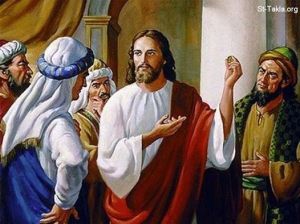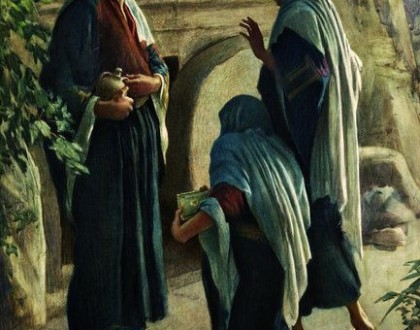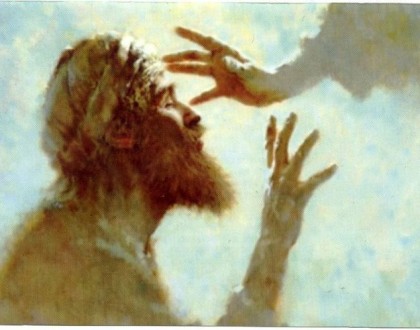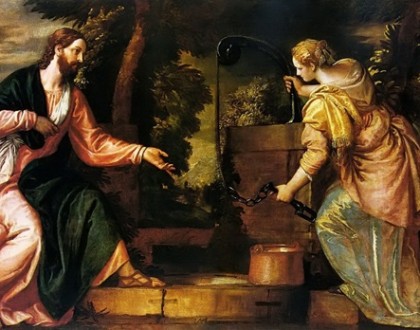29th Sunday in Ordinary Time “God and Caesar”

Sunday October 19th 2014
29th Sunday in Ordinary Time
God and Caesar
They are trying to trap Jesus, by catching him out with a thorny question. They, the Pharisees and Scribes, want to deliberately put him in an inescapably awkward position.
“Tell us then, what is your opinion, Is it lawful to pay the census tax to Caesar or not?”
It’s a very intelligent question to ask, if they want to get him in trouble.
If he responds with a yes, he becomes the enemy of the people. He becomes one who labours under the terrible burden of political occupation and oppression. The consequence of this means he is a collaborator, hated by Romans. If he answers no, then he is in immediate danger of arrest. He will be seen by the Romans as a dangerous revolutionary. The Scribes and Pharisees are trying to undermine Him, destroy his credibility. Jesus deftly escapes from this trap. Leading Him to pronounce one of His most famous one-liners; “Then repay to Caesar what belongs to Caesar and to God what belongs to God.”
It’s a clever line but it’s much more than merely clever. It’s not just about Jesus getting off the hook. It’s about a resolution from Jesus to deal with one of the greatest problems we face; the relationship between Church and State. It is the relationship between politics and religion. Just as that is a complex and divisive question now, today’s Gospel shows us it was a complex and divisive question back then.
First of all, how shouldn’t we read this line? We shouldn’t read it in a black and white way. We shouldn’t say that there are two different worlds, the world of politics and the world of God. There is not a clearly demarcated realm that belongs to the Caesars of the world and a clearly demarcated spiritual realm that belongs to God. We definitely shouldn’t read it in the modern mode where the public mode belongs to politics while as religion is relegated to the private dimension. For someone like Thomas Jefferson, it’s a case of tolerating religion as long as it remains private.
This is not how we are to understand this line of Jesus. Why not? This is because God is God. God is not a being in the world. Not one thing among many. Not so much the Supreme Being hovering above the beings of the world. Rather in our theology, God is the sheer act of being itself. God is that creative power which is here and now sustaining the whole of the Universe, the way a singer sustains a song. What does that mean? It means that even as God suspends the whole of the world, God pervades the whole of the world. God sustains and holds in existence the whole of creation, so we can’t say here is a realm that doesn’t belong to God. Here is realm that belongs simply to Caesar. Everything in the world belongs to God. This is because he is the creator of it.
 Does law belong to God? Ultimately yes. What is Justice? When we are just we participate in God, who is justice itself. What is beauty? When we create beautiful things, we participate in God who is beauty itself. What is love? When we love we participate in God who IS Love. God grounds, pervades, animates and inspires and draws all aspects of reality at their best. Everything leads to God and comes from God. This is why in the book of revelation, in that beautiful vision of the heavenly Jerusalem, we hear there is no temple. This is because in the heavenly Jerusalem when all is properly ordered, the city itself has become a temple. Everything in the city, to the law and courts, to the sports arena’s, to the banks, everything in the city is related to God, grounded in God. The City itself is the temple.
Does law belong to God? Ultimately yes. What is Justice? When we are just we participate in God, who is justice itself. What is beauty? When we create beautiful things, we participate in God who is beauty itself. What is love? When we love we participate in God who IS Love. God grounds, pervades, animates and inspires and draws all aspects of reality at their best. Everything leads to God and comes from God. This is why in the book of revelation, in that beautiful vision of the heavenly Jerusalem, we hear there is no temple. This is because in the heavenly Jerusalem when all is properly ordered, the city itself has become a temple. Everything in the city, to the law and courts, to the sports arena’s, to the banks, everything in the city is related to God, grounded in God. The City itself is the temple.
Therefore, what about our question on religion and politics? This same principle has to apply. Politics is not a realm absolutely separated from the religious. Rather its deepest ground and purpose is spiritual.
When Saint Thomas of Aquinas speaks about law, the nature of law, this is what he says, “The prime law is the eternal law, which is the same as the mind of God. The eternal law is the divine order by which the entire universe is governed”. There is a reflection on this earth of the eternal law; St Thomas calls it the “natural law”. It abides in you and me; we know its principles by an immediate intuition. The natural law grounds our morality, the natural law participates in the eternal law, comes from it, reflects it. That means everything from traffic regulations to anti-trust legislation, the laws being passed right now in congress, are in turn a reflection of the natural law. The purpose of the law is to make us good.
What’s the point here? All law has to do directly or indirectly with God, because natural law nests in the eternal law of God. This is why we are obliged to resist unjust laws. Unjust laws are not just a political problem; they are a moral problem and a spiritual problem.
Think of Martin Luther King’s letter from the Birmingham city jail, in which he quotes Saint Thomas Aquinas, precisely on this point. Why was King resisting the unjust Jim Crow laws of the south? Not just because they were politically problematic, not just because they were a moral affront, but because they were a spiritual affront to God. That’s good Catholic understanding of the nature of law.
So do we go to the other extreme that religion just swallows everything up? Those priests should be constantly supervising everything. Supervising the work of artists and poets and politicians and lawyers? No. And here is where the distinction comes into play. Jesus says; render to Caesar the things that are Caesars. Is there a legitimate independence to creation? Yes. It’s the flip side of the doctrine of creation. Since all things are created by God, all things are related to God. But, because all things are created, nothing in the world is God. Everything in the world has its own independence. There a legitimate realm of independence.
Would I as a priest burst into the dugout in Old Trafford and tell Van Gaal how to manage the Manchester United football team? Why wouldn’t I do that? This is because the realm has its own realm of independence. Do I come bursting into the operating theater and tell the doctor how to operate? No. Of course not! The doctor has his own legitimate, independent realm.
Do I as a priest burst into a courtroom and tell the lawyer how to present his case? No. Of course not! The lawyer has his own world, his own independence. We as Catholics can speak to them, not in themselves as independent disciplines and practices, but in as much as the law, medicine, sports have a spiritual dimension, we do speak to that.
If we don’t render to Caesar what is Caesar’s then religion is overbearing. It’s as if the religious swallows up the secular. We are violating one side of the doctrine of creation, which lets things be. On the other hand if we don’t emphasize the connection between God and all things, then we undermine what they are supposed to be.
Render to Caesar the things that are Caesars. He has got his legitimate realm of independence and renders to God the things that are God’s. Even as we render to Caesar what is legitimately his, we acknowledge as people of faith, that Caesar, politics, law belongs to God.
Recent Sermons

Easter Sunday – The Resurrection
April 14, 2017

4th Sunday of Lent Year A – The Man Born Blind
March 27, 2017

3rd Sunday of Lent Year A – The Samaritan Woman at the Well
March 20, 2017



